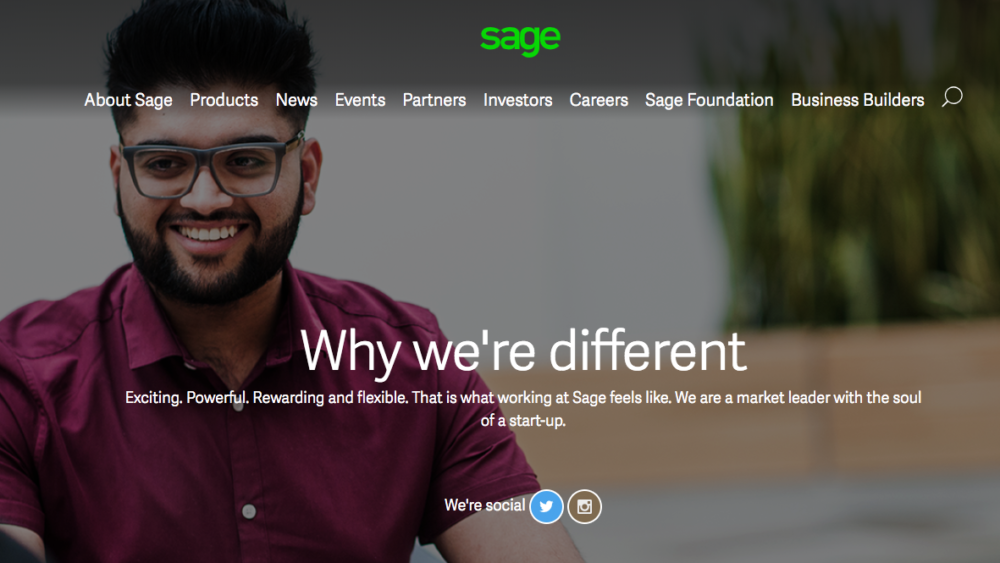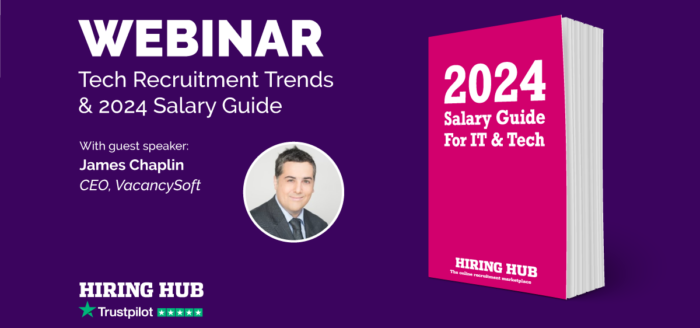
With over 13,000 employees, three million customers and a dominant presence in over 23 countries across mainland Europe, Africa, Australia, Asia, and Latin Americas, Sage is no stranger to the world of tech.
With an incredible back story under its belt, Sage takes the title as the largest British owned tech company in world.
So, our ears pricked up when we caught wind that this tech giant was only now implementing an employee value proposition into the business. Why now? Why such urgency?
So, who better to shed some light on EVP than Sage’s Talent Acquisition Manager, Fiola Myerthall, whose skills and expertise span over fifteen years.
How did Sage arrive at its Employee Value Proposition?
In the past, Sage didn’t have much of a focus on EVP, which is why it’s a priority for us in this financial year.
I’m actually in the process of hiring two people; the first, a Director to head up our EVP strategy as well as strengthening our company culture, diversity and engagement within our current and future workforce.
I’m also currently on the hunt for an Employment Brand Manager, so their role is specifically around our EVP proposition as a whole, as well as our talent acquisition branding.
We had an Employer Brand Manager in the past, and although we’ve always ensured we offer a great salary and benefits package, there was no real appetite within our business to focus on what EVP truly means and how we needed to address it.
This has now changed. Sage recognises EVP as something that’s crucial for us as a business, alongside employee diversity and engagement.
Sage understand that there’s actually more than being just “a brand”. It’s not enough these days. You need to have candidates that want to come work for you and part of that is looking at what we have that that others don’t. We already have many benefits that most companies don’t have but we’re always on the lookout for how we can grow what we offer employees, current and future.
So why the need for EVP all of a sudden, isn’t it just over-hyped management bullshit? I mean, isn’t this stuff obvious, why do you need to make a song and dance about it?
Well Sage has always had a key focus on what it can offer its employees, above and beyond others.
We’ve always made sure we offer competitive salaries, flexible working and a great benefits package as a way to keep our employees happy and engaged. However, we’re always striving to give more to our employees. So, we asked ourselves “what else can we do?”.
And the truth is flexible working, benefits and pay just aren’t everyone’s priority anymore.
One of the things that our employees really shout about when we do our pulse surveys is our corporate social responsibility. Sage invest heavily is CSR.

Credit: www.sage.com
So today, for example, almost everyone is out of the office doing a beach clean-up in Newcastle. So, each employee gets five paid days per year where, like the beach clean, they can give back to the community. Our employees love this!
We call these ‘foundation days’.
So, there’s a division of Sage with its own hierarchy and managers called Sage foundation that acts as the charity arm of Sage so to speak. So, say for example if you want to do a charity run, you can apply for a foundation day and Sage will match what you’re planning to raise, up to a certain amount.
So embodying CSR within your workforce has given your EVP an edge?
Absolutely. When you look on Sage’s Glassdoor reviews, you see current employees shouting about CSR and the Sage Foundation.
So you mentioned you carry out bi-monthly pulse surveys, is that how companies should measure their EVP?
So, I would say there’s two ways from an external market point of view.
Firstly, there’s Glassdoor, which is a review site, kind of like a Trip Advisor for companies.
Glassdoor ratings are kind of an easy way to measure an EVP. You see very quickly when things start to turn around. However, I always take Glassdoor reviews with a pinch of salt because not many people will take the time to write good reviews but they’re very quick to write negative things. But it does show people care, which is core to Sage’s values.
Secondly, you can gauge the success of your EVP following conversations with your talent acquisition teams. They’ll quickly see a pickup in job ad responses and candidates reaching out to Sage. So, we’ll start to see an immediate impact really once it starts to take flight.
From an internal point of view, yes as I mentioned, we carry out pulse surveys aka satisfaction surveys so we could see how all our employees are feeling about their job. It’s not very detailed, literally maybe only six or seven questions max.
We started doing them more frequently, so we can get a better gauge for how employees are feeling about the benefits structure and so we can tinker it accordingly.
For example, we’ve recently added in buying and selling holiday, which employees are feeling very positive about.
During the process of EVP discovery, what would you say was/is the most important element?
That the people are everything.
Companies always tend work on the external brand rather than focus on the internal team and actually for Sage the people are more important.
People will generally come work for Sage because it’s a big brand, a FTSE 100, with an incredible back story behind it with regards to it being the largest British owned tech company in the world.
But actually, what’s more important for us as an organisation is making our current workforce happy and making Sage a place they want to stay at.
Okay, so I’ve figured out what my firm’s EVP is, now what – what do I do with it?
So, one of the biggest challenges is getting buy in from every member of the company. Unless the business has a big appetite for an EVP and they are invested it in from the very top down, it won’t work.
Everyone needs to be bought into it, especially getting stakeholders on-board with what you’re trying to do and to sell the benefits to them.
EVP has to come from the top down. You want to have the CEO shouting about it, so that its ripples down the hierarchy and is incorporated into the whole business.
So, yeah that’s the biggest thing, everyone needs to buy into it.
Can/does an EVP change over time – do you revisit it periodically?
100% it has to be something that evolves.
I mean, take for example when I started working in talent acquisition about 15 years ago, flexible working just wasn’t a thing, you were in the office nine to five. That was it, without question. It was more about financial rewards. Now it’s all about work-life balance.
So nowadays it’s so important that people are able to have flexi hours.
A business has to be able to evolve its EVP, so it’s able to cater to employees changing needs as time goes on.
Want to discover how the firms like Virgin, Travelex, The Hut Group, Box, and EE determine candidate fit? Get your FREE copy of our ‘Ultimate Guide to Interviews’ here to find out more.
Images credit: www.sage.com



